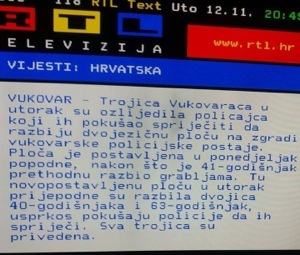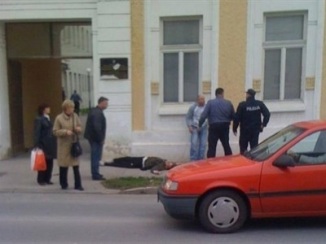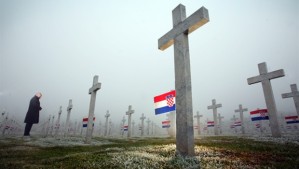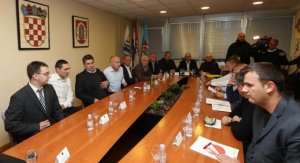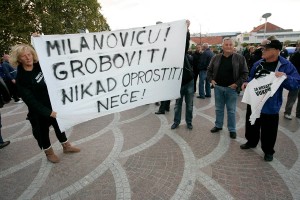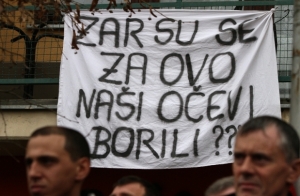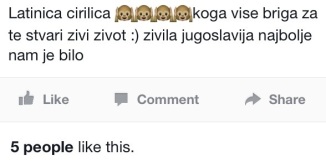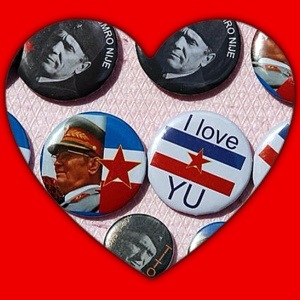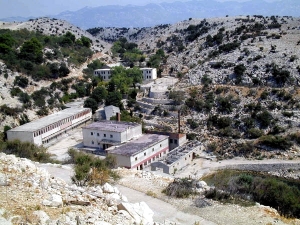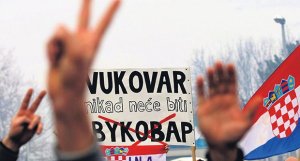
Along the quiet Danube, lies a small city that was ravaged by war after Croatia’s declaration of independence over 20 years ago. Vukovar, bleeds again today.
It is September 4, 2013 and there is no war in Vukovar. When I open CNN’s homepage, there are talks of US intervention in Syria, but there is no mention of Vukovar, because there is no war in Croatia. There are no tanks, guns, or soldiers. Unless you count the war veterans (branitelji) who sit paralyzed in their wheelchairs. When I look at them, I see their hollow, empty eyes, observing the events happening in Vukovar. I try to process the tremendous pain they have in their hearts, equally baffled at the unthinkable: The Vukovar they fought for is now occupied by police who are safeguarding the Latin and Cyrllic signs on government buildings that have sprung in the city the last few days. (Croats use the latin alphabet, Serbs use cyrillic)
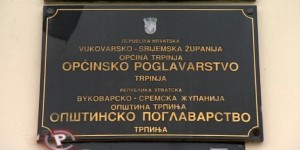
Why is the Cyrillic alphabet igniting such outrage in a small country of 4 million people? When Croatia announced its seccession from Yugoslavia and declared independence, Serb rebels (četniks) were outraged by this and eventually captured Vukovar during a bloody 3 month siege which claimed the lives of 2,000 people and displaced thousands more. This would be the start of the 4 year war in the latest chapter of Croatia’s bloody history – The Croatian Independence War (Domovinski Rat).
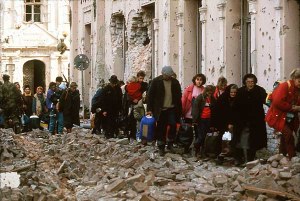
When I look at the picture above, I travel back in time to 1991. It was transitioning from fall to winter and the leaves had fallen off the trees – it was November in Canada – the start of a new dreary and grey winter season. For me personally, a depressing time of the year. This picture left an impact on me, so much, that the feeling still resonates 20 years later. I remember coming home from school that day, and upon greeting my parents, I knew something was wrong. My mother had tears in her eyes, and my father was screaming at the TV. Trying to break through the chaos and understand what my parents were so upset about, I kept hearing: Grenades, Vukovar, Serb rebels, Ovčara, Ceasefire, Vukovar, killings, Siniša Glavašević, Vukovar, Vukovar, Vukovar … The truth is, at the time, I’ve never even heard of Vukovar, Ovčara or Siniša Glavašević.
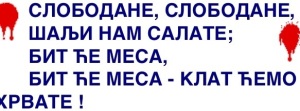
“Slobodane Slobodane pripremi salate, bi’će mesa bi’će mesa, klat čemo Hrvate” (Slobodan, Slobodan prepare the salad, there will be meat, there will be meat, we will slaughter the Croats). The words to this song still haunt me to this day. This is what the četniks sang while marching through a destructed Vukovar. Vukovar at this point was abandoned and its citizens were the latest casualties of war. Their fate was either to be killed, or to be displaced. Vukovar was under siege, and the international media did not dare go there. However, the world did get daily radio reports all because of a young and brave reporter who stayed in the city under siege. Siniša Glavašević was the chief editor of Vukovar radio and was often known as the ‘Voice of Vukovar’.
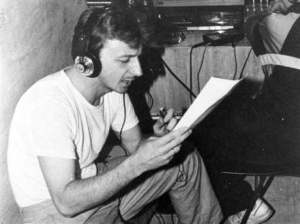
“The picture of Vukovar at the 22nd hour of the 87th day [of the siege] will remain forever in the memory of the witnesses of this time. There are infinite spooky sights, and you can smell the burning. We walk over bodies, building material, glass, detritus and the gruesome silence. … We hope that the torments of Vukovar are over” – Siniša Glavašević 18.11.1991
This is an exceprt from the last report he gave. Glavašević was killed in what was known as the Vukovar Hospital Massacre in Ovčara. It is estimated that 300 Croats were brutally beaten, tortured and executed there between Nov 20-21st, 1991. His body was later exhumed in 1997 from the mass grave of Ovčara. Vukovar suffered the greatest loss of human life during the war with a total of 2000 civilians killed (mostly Croat), 800 missing, and over 20,000 displaced.
Today, the population of Vukovar is divided into two ethnicities – 2/3 Croat, and 1/3 Serb. In 2009, the Croatian government voted that ethnic minorities have the right to use their respective languages for official purposes such as the names of public institutions or streets in areas where they make up more than a third of population. Croats want Vukovar to be exempt from this law because the wounds are still fresh for most Croats, especially to Marijan Živković who lost 2 sons in Vukovar.
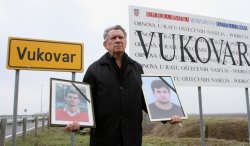
Earlier this week at the protest in Vukovar, Živković demonstrated his frustration with the new law and took a hammer to the newly erected bilingual sign.

The Croatian leftist government (SDP) isn’t keeping quiet about the events in Vukovar. President Ivo Josipović condemned the protests and said that laws, which were constituted by all government parties 3 years ago, must be obeyed. He has recently said “If there exists a cafe for Serbs, and a cafe for Croats, there will never be happiness. I am for integration and not assimilation, and we must respect each other”.
My question is, who’s cafe is Mr. Ivo Josipović sitting in? Where was Mr. Josipović and all his other communist compatriots in 1991? What were they doing when barbarous Serb rebels encroached on our beloved homeland, wiping everyone and everything in sight? What was Croatia’s premier Zoran Milanović doing while my 31 yr old cousin was killed in Osijek, leaving behind a pregnant wife and 1 year old daughter? The current communists members of parliament were all young men in their 20’s during the war – did their arse even see the front lines? Did Mr. Josipović or Mr. Milanović stand side by side with the sons of Marijan Zivković, defending their beloved homeland? Mr. Josipović and Mr. Milanović, do you realize that since the war, over 2000 Croatian war veterans have taken their own lives?
So please, Mr. Josipović, don’t talk to me about integration. Don’t talk to me about forgiveness. Don’t talk to me about your old Yugo slogan “Brotherhood and Unity” (Bratstvo Jedinstvo) . Wake up and see that the country you are in charge of is bleeding!
